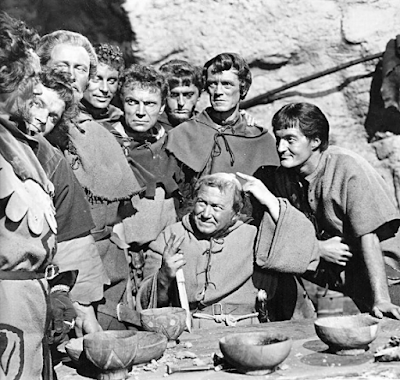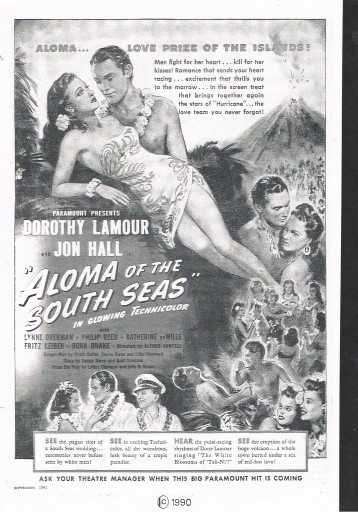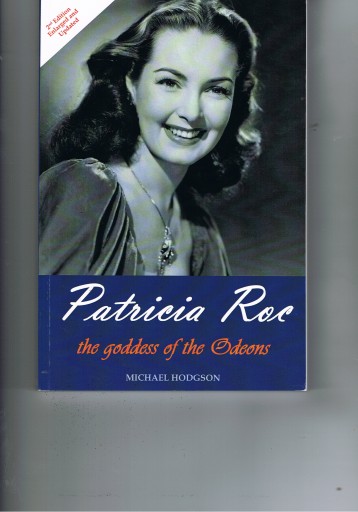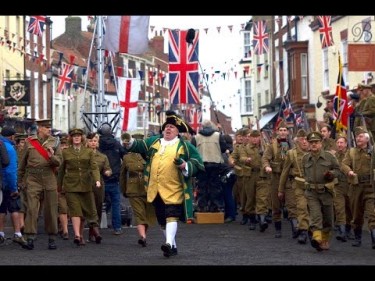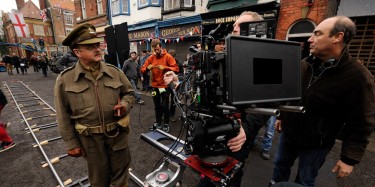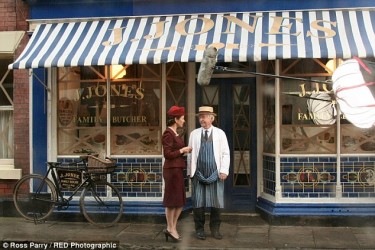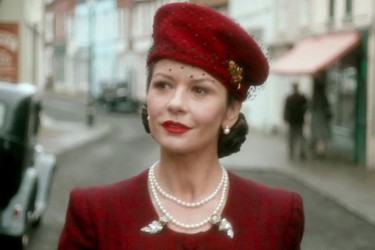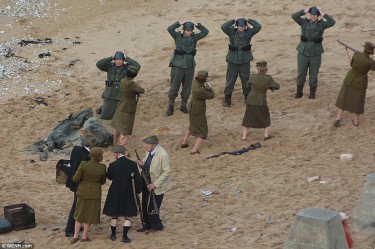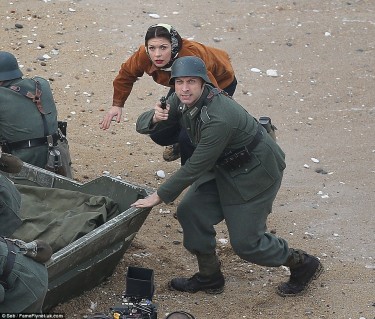I do have this film on video – it is some years since I have seen it though but it is memorable with a good story.
However I am reprinting this article on the film written by someone else :-
It’s a few years after the end of WWII, and Robert Rawley (Murray), a self-made millionaire (or thereabouts), cannot get over the fact that his beloved son by his first marriage, Simon, was one of those who never came back from the Front. Now he’s building a new cricket pavilion in the nearby village to commemorate Simon—even though his bumbling aristocratic neighbor, Lord Harry Clandon (Hicks), urges him to alter the dedication to honor not just Simon but all of the local men who died in the war, as does Robert’s second wife, Joan (Campbell), née Cummings,
Robert: Man can’t live with the dead.
Joan: No. But how hard you try.
Robert is a man whose snarl is very much worse than his bite. We see this essential goodheartedness in an early sequence when he’s informed by the foreman of the team working on the pavilion, Sugden (Woodbridge), that one of the laborers has fallen off the construction, damaging both the weathercock and himself. Robert rants about the lad’s stupidity and clumsiness and the fact that the broken weathercock might delay the Grand Opening, but at the same time he slips Sugden a hefty contribution to any medical expenses the culprit might have—more than enough to cover them all, if we’re to judge by Sugden’s expression.
The blind but undaunted Robert (Stephen Murray).
We first become aware that Robert’s blind when he trips over the tricycle that Clandon, who has come to visit, left at the steps of the mansion. Since we’ve earlier seen the Rawleys arrive home in a luxury car, it’s very clear how the war has changed social structures. There are strong hints that the mansion used to be the Clandon family’s home before financial vicissitudes forced them to sell it. We also see, as the obviously decent-hearted lord tries to persuade Robert to dedicate his pavilion to all the fallen, not just one, that Clandon is in many ways far more a “man of the people” than Robert could ever be, for all the latter’s pride in having worked his way up from nothing.
There are more visitors. First comes Simon’s widow Angela (Gray). She’s been serving in a post in Berlin, and has come home for the pavilion’s dedication in the company of Clandon’s nephew, Captain Maxwell “Max” Oliver (Farr), likewise posted there. The elder Rawleys and Clandon believe the two must have met en route; it’s instantly obvious to us, however, that the relationship between them is far older and closer than that, so it’s not much of a surprise when the bombshell is dropped that they secretly married a month ago.
Angela (Sally Gray) is nervous of giving Robert her news.
The other visitor arrives by night and unannounced, having hijacked a car and thumped its owner during the journey: Simon (Patrick; for a moment you might think it was Bill Murray), who is not dead at all but deserted his men in the heat of battle and has been on the run ever since. He’s come to see if he can get enough money out of his father to escape to the US and make a new life there. Both Angela and then Joan are horrified when they find him in the house, but they conspire to keep the news from Robert, reckoning that discovering the son he idolized is in fact a blackguard would destroy him. Max, too, enters into this conspiracy of silence. But how long can they all keep it up? And what of Angela’s marriage to Max, now that he and Simon are—as Simon puts it—”husbands-in-law”?
Simon (Nigel Patrick) breaks in through a basement window.
Simon (Nigel Patrick) is full of glib talk except when his father’s around.
Angela (Sally Gray) is horrified to discover her loathed husband is still alive.
There’s a great deal of darkness in the tale—inevitably, since we know this cannot end in anything other than some form of tragedy—and it’s reflected in some superbly noirish cinematography. The contrast between this and the overall bucolic, well-to-do setting makes Cooper’s camerawork all the more effective. (I’ve put a selection of noirish frames at the foot of this entry.) Also of cinematographic note is the special effect used at one stage to represent Robert’s reconstruction in his memory of having gone into the drawing room and sensed something wrong there. Obviously he couldn’t actually see what was there, but his memory of the moment could be a quasi-visual one. Cooper puts it on the screen as a sort of washed-out spectral version of the room, a representation that, at least for the nonce, seems quite credible.
The visualisation of Robert’s memory of sensing Simon (Nigel Patrick) in the drawing room.
Despite the bleakness, there’s some excellently handled humor too—in fact, the screenplay is quite glorious throughout, probably because of its stage origins. One running joke concerns the mother of the Rawley’s maid Nellie Wells, portrayed with a very great degree of charm by Owen. It first appears when Lord Clandon arrives at the house and Nellie greets him at the door:
Clandon: How’s your mother?
Nellie: Oh, worse, my lord.
Clandon: Hmf. She always was.
Yvonne Owen delivers a great turn as the maid Nellie.
The exchange evolves during other encounters that occur during the course of the movie, such as
Clandon: How’s your mother? Worse?
Nellie: Yes, thank you, my lord.
There’s comedy too in the character of the cook, played with her usual brio by Handl. When Simon arrives at the house he’s starving, and—having helped himself handsomely to the whisky from his father’s decanter—he deputes Angela to go steal some food from the larder for him. The food she takes (and wraps in a sheet of newspaper!) includes a pair of chicken drumsticks that the cook has set aside for Robert. Explaining about the mysterious disappearance to him later, the cook says:
The drumsticks, sir. They vanished into thin air. I was saying to Nellie, wasn’t I, that’s the first time I’ve known a pair of legs to grow wings.
The cook (Irene Handl) and Nellie (Yvonne Owen) explain to Robert (Stephen Murray) about the mysterious affair of the drumsticks.
Comedy of a completely different and far darker order—if indeed we can call it comedy at all—comes in an extended flashback sequence as Simon explains to Joan the truth of his wartime career, putting the best light he possibly can on his own behavior. In the opening moments, as shells rain down on Simon and a couple of his men and he cracks, we accept his voiceover narration of events as truthful. Who among us might not likewise turn and flee under such hellish circumstances? But, as time goes on, the events recounted in the voiceover and those we see on screen diverge radically: while Simon’s telling us that “A lot of deserters went crooked, and made a packet that way, but anything I made I came by honestly. I was down and out, but at least I kept my hands clean,” we see him stealing vehicles, clobbering those who get in his way, and chatting up a sexy chanteuse (Var) in a swish nightclub (and stealing from her purse). The scar he acquired on his cheek during the war came not in combat, as everyone assumes, but when he dived through the nightclub window to escape from an officer who recognized him.
The sultry chanteuse (Maria Var) whom Simon both attempts to seduce and robs in the continental nightclub . . .
. . . but then he’s recognised by an officer (uncredited).
Put all this together with a superb score by Georges Auric and you’d expect Silent Dust to be a classic. It isn’t, but it doesn’t fall so very far short. Among the flaws that hamper it are a few somewhat gauche transitions, as if the editing were done in a hurry, and Murray’s Yorkshire accent, which comes and goes unpredictably, as if sometimes he forgot. Overall, his performance is rather the odd one out: while the rest of the cast are fairly naturalistic (or as much so as you’d expect in a UK movie of this era), Murray delivers something far more attuned to the stage. This may very well have been by design, because—counterintuitively—in context it works very effectively, creating a distancing of him from the others that underscores the representation of his blindness.
Angela (Sally Gray) and Max (Derek Farr) have the portrait of Simon looming over them.
I found myself able to overlook the very minor blemishes—and I also found myself quite often genuinely moved. There’s the moment, for example, when Robert discovers—perhaps for the first time in his life?—what the meaning of love truly is when he realizes that Joan would rather have been bled of money for the rest of her life in the form of extortion payments to Simon than cause Robert the pain of finding out what a second-rate skunk his son is.
He has a lesson to learn from the elderly Lord Clandon, too—another father who has lost a son to war:
Clandon: Just a moment, Rawley. May I make a suggestion? When my son was killed, I hid away every picture of him in the house. If you do the same, I believe it’ll save you a lot of unhappiness.
Robert: I don’t need pictures to remind me, Clandon. I can’t see them, remember?
Clandon: Quite so. But other people can.
UK / 82 minutes / bw / ABPC, Independent Sovereign, Pathé Dir: Lance Comfort Pr: Nat A. Bronsten Scr: Michael Pertwee Story: The Paragon (1948 play) by Roland Pertwee and Michael Pertwee Cine: Wilkie Cooper Cast: Sally Gray, Stephen Murray, Derek Farr, Nigel Patrick, Beatrice Campbell, Seymour Hicks, Marie Lohr, Yvonne Owen, Maria Var, James Hayter, George Woodbridge, Edgar Norfolk, Irene Handl.



















